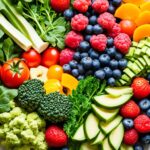When I was becoming a mother, I faced an extra hurdle – polycystic ovary syndrome (PCOS). PCOS can make it harder to get pregnant and affect the pregnancy itself. This made me worried about my baby’s health. So, I looked into using food to handle PCOS during pregnancy.
A good diet for PCOS during pregnancy was key to easing symptoms and having a better pregnancy. I realized that making smart food choices was crucial. It was about feeding my body the right stuff for dealing with PCOS’ challenges.
This article tells my story and gives a nutrition guide for women with PCOS who are pregnant. We’ll look at how a special PCOS diet can make pregnancy better. Making small diet changes can have a huge positive effect on our pregnancies.
Key Takeaways
- Women with PCOS must eat right during pregnancy to control symptoms and have a safe pregnancy.
- Eating for PCOS while pregnant can reduce risks like gestational diabetes and preeclampsia.
- Add foods rich in nutrients, like greens, nuts, and whole grains, to get more fiber.
- Eating proteins from soya, tofu, and eggs can help you stay healthy and help your baby grow.
- Stay away from empty-calorie foods like white pasta, baked goods, and sweets.
The Importance of a PCOS-Friendly Pregnancy Diet
A PCOS-friendly pregnancy diet is key to managing symptoms. It cuts the risk of gestational diabetes, preeclampsia, and preterm labor. A proper diet helps minimize these risks for a safe pregnancy.
It’s crucial to eat well during pregnancy with PCOS. Both the mother and baby need special, nutritious food. These foods meet our unique health requirements.
With a diet designed for PCOS, we can stay healthy and lower complication risks. It helps control weight, blood sugar, and hormones.
Minimizing the Risk of Gestational Diabetes:
- Eat complex carbs like whole grains, legumes, and veggies. These foods give lasting energy and steady blood sugar levels.
- Avoid refined carbs such as white bread and sugary treats. Opt for whole foods that keep your blood sugar even.
- Get enough lean protein from meats, fish, eggs, and plant sources. This supports you and your baby’s health.
- Add healthy fats from avocados, nuts, and olive oil to your diet. They supply vital nutrients and help regulate your hormones.
Preventing Preeclampsia and Preterm Labor:
- Eat foods high in antioxidants, like berries and greens. They reduce inflammation and preeclampsia risk.
- Include omega-3 sources such as fish and nuts. These help baby’s brain and cut preterm labor chances.
- Consume plenty of calcium for strong bones and to prevent preeclampsia. Dairy, greens, and fortified plant milk are good sources.
These nutrition tips can help make a balanced, PCOS-friendly pregnancy diet. It’s wise to speak with a healthcare provider or dietitian. They can help tailor a nutrition plan to your specific needs.
Healthy Food Choices for PCOS during Pregnancy
Women with PCOS need to eat well during pregnancy. This means choosing foods packed with nutrients. These foods will help both you and your baby stay healthy. So, it’s important to focus on what your body needs.
Increasing your fiber intake: Make sure to eat plenty of fiber every day. You can get fiber from foods like leafy greens, nuts, and whole grains. Not only does fiber help your digestion, but it also keeps your blood sugar stable. Plus, it’s great for managing your weight and includes important nutrients for your pregnancy.
Including protein-rich foods: Eating enough protein is crucial for those with PCOS during pregnancy. Add protein-rich options like soya, tofu, and eggs to your diet. These foods keep you feeling full, help balance your blood sugar, and promote a healthy weight gain.
Choosing anti-inflammatory foods: Inflammation can be a big issue for those with PCOS, even more so when pregnant. Focus on eating foods known to fight inflammation. This includes tomatoes, olive oil, and omega-3 fatty acids. These choices can also help with blood pressure and cholesterol, lowering the chances of PCOS-related problems.
By choosing wisely what you eat, you’re offering the best nutrition for yourself and your baby. Always talk to your doctor for diet advice that fits your unique situation.

- Increase fiber intake: leafy greens, nuts, and whole grains
- Include protein-rich foods: soya, tofu, and eggs
- Choose anti-inflammatory foods: tomatoes, olive oil, and omega-3 fatty acids
Foods to Avoid for PCOS during Pregnancy
It’s vital for women with PCOS to watch what they eat while pregnant. They should dodge foods that pile on calories but offer little nutrition. This can help them steer clear of complications and ensure a smoother pregnancy journey. Choosing the right foods is key to managing PCOS during this critical time and keeping both mom and baby healthy.
Here is a comprehensive list of foods to avoid for women with PCOS during pregnancy:
- Avoid white pasta, rice, and bread. Opt for whole grain alternatives that provide more fiber and essential nutrients.
- Avoid baked and processed foods, as they are often high in unhealthy fats, sugar, and artificial preservatives.
- Steer clear of candies, chocolates, and snacks that are laden with added sugars and may contribute to gestational diabetes and excessive weight gain.
- Avoid salty and spicy fried snacks, as they can lead to high blood pressure and water retention.
- Limit your consumption of aerated drinks and soda, which are often high in sugar and empty calories.
Eating a balanced, nutrient-rich diet is critical for pregnant women with PCOS. Avoiding the listed foods helps increase essential nutrition intake. It also lowers the chances of complications linked to PCOS during pregnancy.
For valuable insights and tips on managing your PCOS diet during pregnancy, check out this helpful resource.
Supplementation for PCOS during Pregnancy
Keeping a healthy diet is crucial for women with PCOS during pregnancy. But sometimes, the diet alone might not meet all needs. Supplements fill in the gaps, ensuring the mother and baby get all the necessary nutrients for their growth and development.
An important supplement for these women is omega-3 fatty acids. They help the baby’s brain develop and reduce inflammation in the mother. These fats can come from fish oil or flaxseed oil.
Prenatal vitamins are highly recommended too. They have folic acid, iron, and calcium. These are essential for the baby’s growth and keeping the mother healthy.
For women with PCOS, vitamin D is critical. PCOS often links with low vitamin D levels. Having enough can balance hormones and ensure a healthy pregnancy.
Don’t forget about calcium either. It’s key for strong bones and teeth. Pregnant women need at least 1,000 milligrams daily. This can be from supplements or from calcium-rich foods.

Adding these supplements to a PCOS pregnancy diet can fix nutrient gaps and support a healthy pregnancy. Always talk to your doctor before adding any new supplements. They can give you the best advice based on your unique needs.
Focusing on Insulin Resistance and Inflammation
Insulin resistance and inflammation are often found in those with PCOS. To have a healthy pregnancy, we must focus on diets addressing these issues. These diets should aim to lower insulin resistance and fight inflammation.
For women with PCOS during pregnancy, managing blood sugar is vital. Eating slow-release carbs helps keep blood sugar steady. Foods like whole grains, legumes, and sweet potatoes are good for this. They give long-lasting energy and keep your blood sugar level.
Eating anti-inflammatory foods is good for pregnant women with PCOS. Omega-3 rich foods, such as salmon, chia seeds, and walnuts, fight inflammation. Including them in your diet often can make you feel and stay healthy.
Improving your gut health is beneficial for PCOS symptoms and inflammation. Probiotics from foods like yogurt, kefir, and sauerkraut are a good start. They help balance the gut’s good bacteria, aiding in less inflammation and better digestion.
Key Takeaways:
- Incorporate slow-release carbohydrates, such as whole grains, legumes, and sweet potatoes, to manage blood sugar levels.
- Add anti-inflammatory foods rich in omega-3 fatty acids, like fatty fish, chia seeds, and walnuts, to reduce inflammation.
- Include probiotics from fermented foods like yogurt, kefir, and sauerkraut to support gut health and reduce inflammation.

Specific Food Recommendations for Each Trimester
Throughout your pregnancy, your body will change and need different nutrients. This is especially key for women with PCOS to ensure a healthy pregnancy. Here are food suggestions for each trimester:
First Trimester
Early on, focus on foods packed with vitamins and minerals. Eat leafy greens, lentils, and citrus for folate, which aids the baby’s early development. You should add poultry, fish, and tofu to your meals to meet your higher protein needs. Also, keep up on water intake and eat hydrating foods like watermelon and cucumber.
Second Trimester
During this phase, you’ll need more energy as your baby grows. Opt for complex carbs found in whole grains, sweet potatoes, and quinoa for lasting energy. Include fruits, veggies, and legumes for fiber to help with digestion and avoid constipation. Remember, foods like yogurt, milk, and cheese are important for your baby’s bones.
Third Trimester
In your final trimester, you’ll need extra calories and nutrients. It’s a good time to have healthy fats from avocados, nuts, and olive oil. Prioritize iron-rich foods such as lean red meat, spinach, and dried fruits to prevent anemia. Also, add in omega-3 foods like salmon and chia seeds to boost the baby’s brain and eye growth.

Remember, these suggestions are general. Each woman and pregnancy is different. So, always talk to your doctor. They can give you diet tips made just for you and your PCOS during pregnancy.
For more on nutrition while pregnant, check reliable sources like Today’s Dietitian.
Staying Hydrated and Avoiding Risky Foods
Keeping hydrated during pregnancy is key, especially for those with PCOS. Drinking enough water helps with amniotic fluid, prevents morning sickness, and fights constipation. It also makes you feel better all around.
Try to drink 8-10 glasses of water every day. Herbal teas, fresh fruit juices, and electrolyte drinks make good alternatives. They spice up your hydration game.
Being careful about what you eat is also crucial while pregnant. Women with PCOS should steer clear of foods that might hurt them or their baby.
Avoid things like undercooked meats, soft cheeses, sushi, and too much caffeine. These items could have dangerous bacteria or too much mercury. They’re not safe for your growing baby.
Eat a wide range of healthy foods full of essentials like vitamins and minerals instead. Load up on fresh fruits, veggies, lean proteins, grains, and good fats. These choices are much better for you and your little one.

Conclusion
A PCOS-friendly diet is vital for pregnant women. It helps both the mother and the baby stay healthy. Eating right can manage PCOS symptoms and lower risk of complications. In this article, we gave a detailed nutrition guide for pregnant women with PCOS.
Following the correct nutrition advice and picking healthy foods is crucial. Choose nutrient-rich foods and steer clear of those high in calories. It’s also key to drink plenty of water. Taking supplements might also help get all the nutrients you need.
Always talk to your doctor before changing your diet when pregnant. They can give you advice customized for your situation.
Want to learn more about eating well with PCOS while pregnant? Check out this scientific article. It offers great insights and more details on the subject.














